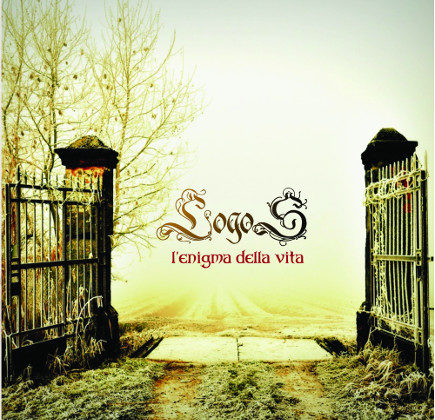I have to confess that unlike other reviews, in which I’m used to try interpreting the messages more or less hidden in an album, this time I’ve been helped by a band member. Catching the meaning behind the tracks was not easy even for an Italian speaking. The band has released only 3 albums in about 20 years of activity and this one has been planned for more than ten. It’s not a surprise then, that the arrangements are almost perfect, the tracks are quite complex and the album flows seamlessly from one moment to another. The genre, if this word means anything, is classic RPI, but I can hear, or think to hear, influences other than Le Orme, Genesis and Yes.
Now the concept: the album’s title means “the enigma of life”, and is a sort of travel from the Genesis (the biblic one, not the band) or the birth to the end of times or death, with the eternal question about “is there anything after?”
The first impact is Floydian. The keyboards layer and the guitar of “Antifona” reminded me to the intro of the last two Pink Floyd albums (excluding the new one which I haven’t listened to yet). This impression ends suddenly when bass and drums enter slightly in 5/4, with a mood that more than Genesis is set to the best Camel. “Antifona” derives from Greek and could be literally translated as “voice from the front” which was typical in Gregorian choirs. The word was used to indicate the was a Psalm is spelled.
“Venivo da un Lungo Sonno” is what made me think to Camel. Of course I’m speaking of impressions only. The guitar sounds more like Hackett than like Latimer, but it’s a very good classic prog song. About 4 minutes of instrumental intro, the last of which is filled by a slow guitar harping which introduces the main theme of the song. I have read somebody thinking that Zerman’s vocals are the album’s weakness. I disagree. Zerman is ok. The weakness is in the lyrics metric, but this is common to the Italian Prog. Pierrot Lunaire, Maxophone, even PFM have sometimes fought against the metrics to make their lyrics fit in the music. It can happen when the meaning of what you are writing is too important. Said so, “coming from a long sleep” represents the Birth, both intended as one’s birth and the birth of Life or the Creation. The lyrics are the introduction to the following song. Waking up is not only coming to life. The instrumental coda is excellently driven bu the lead guitar.
“In Fuga” (Escaping) is the song which more impressed me at the first listen. The vintage sound of the keys, the mellotron and the lyrics inspired to a book that I’ve read many years ago about the Italian campaign in Russia during the II World War. It’s highly dramatic and the dialogue between keys and guitar in the instrumental parts is at the level of the best Caravan (I mean Winter Wine or 9 Feet Underground). Italian or not it’s great progressive rock.
“Alla Fine Dell’Ultimo Capitolo” (At the end of the Last Chapter) Is of course about Death and the moments preceding the passing away. I initially thought, following the previous song, that it could have been about Stalingrad or Hiroshima (The imagine of Men’s figures impressed on a brick’s wall). It’s darker than the previous songs, based on minor chords with recurring accents and the high pitched guitar setting the mood in background while keys, drums and bass make the bigger part of the job. The fact that some passages bring to my mind albums like Snow Goose and Nude, from one of my favorite bands, is a plus.
“N.a.s.” is the longest track. It’s instrumental. I won’t disclose what the meaning is. Basing on what a band member has written to me ,it’s better leaving the interpretation to the listener. This is also the reason why the lyrics are not very explicit. Leaving the listener the possibility of creating his own story is one of the goodies in progressive music. Musically speaking, it’s another dark track, with the bass pumping obsessively, some little dissonances in the chords, but still maintaining a melody and a symphonic (prog) structure. A track like this can justify the cost of the whole album.
The title track has probably the best lyrics of the album. Ok, if you can’t read Italian, just trust me. The song is very particular. I can’t relate it to anything else, maybe Steve Hackett, but it has a lot of things inside. It changes theme, signature and mood several times. The passages are everything but trivial, sometimes surprising, but without losing coherence or continuity. In this sense, the fact that the metric is almost absent is in line with the continuous changes of scale.
“In Principio” (In the beginning) starts from the Genesis to speak of “Life and Death”. Mellotron and an acoustic guitar in the vein of Anthony Phillips are followed by a bluesy keyboard riff. Effectively, the instrumental parts are better than the sung ones, but it’s not a singer’s fault. It’s that the music is so good that we could easily give up to lyrics, even when poetic as in this case.
“Completamente Estranei” (Totally Extraneous) starts with a high-pitched keybord harping, let’s say in Goblin’s style. It’s another very good instrumental moment which lasts for three minutes until the vocals start. It’s just a short interlude followed by another excellent instrumental part, full of variations. The song is about racism and “mental blindness” in general.
“In Quale Luogo Si Fermo’ Il Mio Tempo” (Where Did My Time Stop?) is a piano solo with a classical mood but with some rock accents. Sad and dramatic but still very prog. It’s where the influence of Le Orme appears.
“Pioggia In Campagna”(Rain in the Country) can be read with two different keys, like most of the lyrics of this album. It’s about the passing of time, in the sense of a lifetime that goes with good and bad moments, but also as the passing of eages. Skeleton of cars with grass growing inside give the idea of Earth after Man. The song is divided in two well distinct moments: a proper song which is one of the most melodic moments of the album and an instrumental part which reminds me back to Camel. I must clarify that I don’t consider this music derivative. Mentioning Le Orme, Camel, Genesis, is just to give the reader an idea about the kind of music that he will find in this album. It doesn’t mean that the band is not original. The keyboards in the last two minutes sound not too far from Rick Wakeman’s Six Wives, but it’s question of sounds and instruments used, not of musical notes.
But the thing that I have liked the most is the closing track which is the darkest moment of the album. Like often happens in prog, it gives circularity to th e album. The lyrics start exactly with the same words of the first track. Like saying that the end can be a new beginning. The voice fits very well in the music. It’s very atmospheric, the only bad thing is that it’s too short. For my tastes the band could have fit a whole album with this track, but prog is normally not easy to sell, and sincerely hope that the band can gain at least what is needed for a new album, in less than ten years this time, possibly.
Classic RPI which doesn’t have anything less than Orme, Banco or PFM. A strong concept, cryptic enough to give you the possibility of building your own story on it, and most of all a great musicianship. Another important album for the Italian prog. If you like any of the artists that I’ve mentioned as reference, you will surely appreciate this band, too.
A big thumb up from a usually non-RPI fan.

